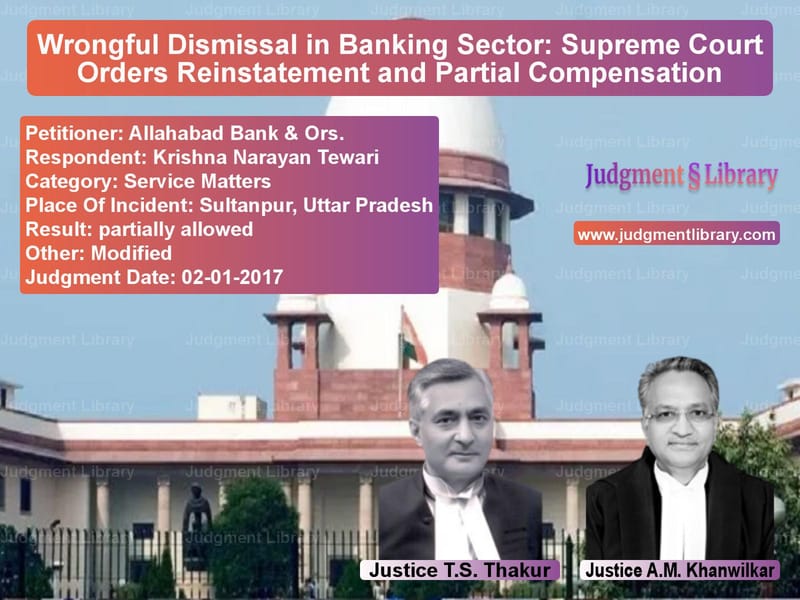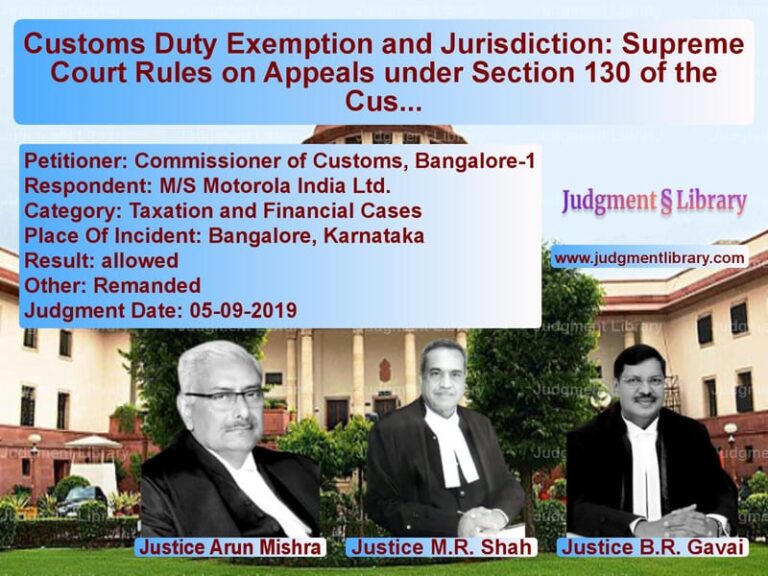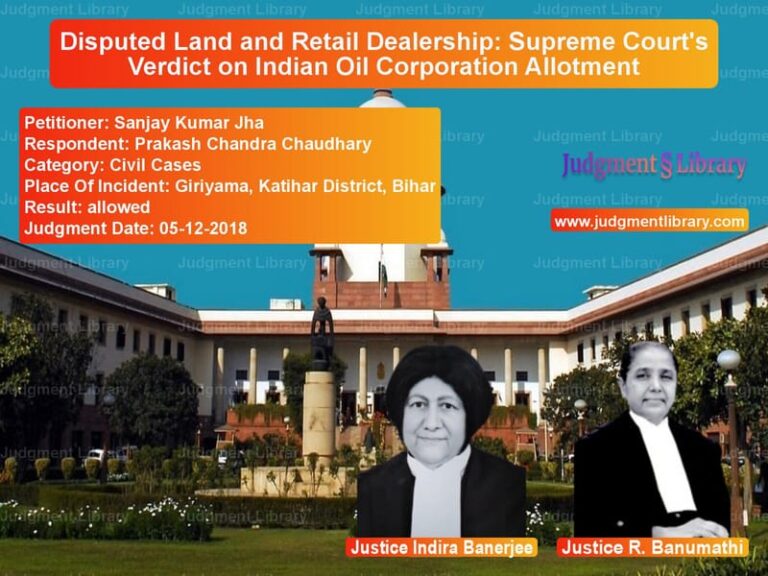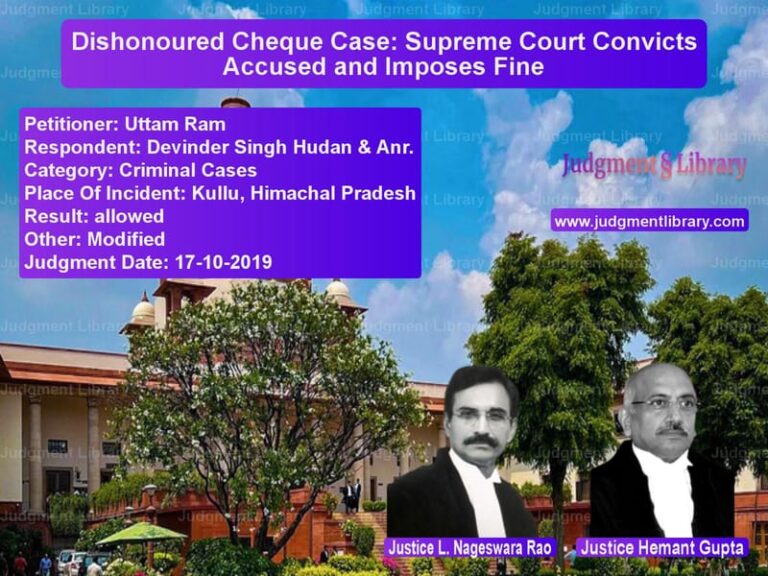Wrongful Dismissal in Banking Sector: Supreme Court Orders Reinstatement and Partial Compensation
The Supreme Court of India, in the case of Allahabad Bank & Ors. v. Krishna Narayan Tewari, examined the legality of an employee’s dismissal and whether due process was followed in his disciplinary proceedings. The case arose from disciplinary action taken against the respondent, an officer of Allahabad Bank, which resulted in his removal from service. The Supreme Court upheld the High Court’s ruling that the dismissal was unjustified but modified the relief granted to the employee.
Background of the Case
The respondent, Krishna Narayan Tewari, was working as an Officer-in-Charge at Allahabad Bank’s Sultanpur branch in Uttar Pradesh. On December 10, 2004, he was suspended due to allegations of misconduct. A charge sheet was issued on February 10, 2005, and an inquiry was conducted. The disciplinary proceedings concluded within 45 days, and the Enquiry Officer found him guilty on all charges except two, which were partially proved. Based on these findings, the Disciplinary Authority imposed the penalty of removal from service. The Appellate Authority upheld this decision on January 5, 2006.
The respondent challenged his dismissal before the High Court, which found serious procedural flaws in the inquiry. The High Court quashed the dismissal order and directed the bank to reinstate him and grant all service and retirement benefits within 90 days.
Arguments by the Petitioner (Allahabad Bank)
- The bank contended that the High Court exceeded its jurisdiction by re-evaluating the evidence and holding the respondent not guilty.
- It argued that as long as there was some evidence supporting the Disciplinary Authority’s findings, the High Court should not interfere.
- The bank maintained that even if procedural lapses were found, the appropriate remedy was to remand the case back to the disciplinary authorities for a fresh decision rather than outright quashing the dismissal.
Arguments by the Respondent (Krishna Narayan Tewari)
- The respondent argued that the disciplinary inquiry was unfair and violated the principles of natural justice.
- He claimed that he was denied a reasonable opportunity to defend himself and present evidence.
- He pointed out that the findings of the Enquiry Officer were perverse and lacked supporting evidence.
- The Appellate Authority had merely copied the Disciplinary Authority’s findings without independent examination.
- He further emphasized that he had suffered serious health issues, including a heart attack and a stroke, making any further litigation or rehearing impractical.
Observations of the Supreme Court
- The Court reaffirmed that writ courts should not ordinarily interfere with factual findings in disciplinary inquiries unless the findings are wholly unsupported by evidence or violate principles of natural justice.
- The Supreme Court observed that the Disciplinary Authority and Appellate Authority had not recorded independent reasoning and had mechanically upheld the Enquiry Officer’s findings.
- It noted that the High Court was justified in interfering with the dismissal since the inquiry process lacked fairness and due consideration of the respondent’s defense.
Final Judgment
The Supreme Court modified the High Court’s order as follows:
- The dismissal order was quashed, and the respondent was deemed to have served until his superannuation.
- He was entitled to all retirement benefits.
- Instead of full salary for the period between dismissal and retirement, he was awarded only 50% of the salary for that period.
The Court reasoned that although the respondent had been wrongfully dismissed, granting full back wages would be excessive. The balance struck by awarding 50% salary ensured justice while acknowledging procedural lapses.
Significance of the Judgment
This ruling has important implications for employment law and disciplinary proceedings in the banking sector. It reinforces that:
- Disciplinary authorities must conduct inquiries fairly and provide employees with a proper opportunity to defend themselves.
- Findings must be backed by substantial evidence, and appellate authorities must independently evaluate cases.
- High Courts can intervene when disciplinary proceedings are arbitrary or violate due process.
- Even if dismissal is overturned, full back wages may not always be granted; courts may provide partial relief to balance equity.
Conclusion
The Supreme Court’s decision in this case highlights the necessity for fair and transparent disciplinary proceedings in the banking sector. It ensures that employees are not dismissed arbitrarily while also preventing excessive financial liabilities on employers due to procedural flaws. The ruling serves as a critical precedent for employment disputes involving wrongful termination.
Don’t miss out on the full details! Download the complete judgment in PDF format below and gain valuable insights instantly!
Download Judgment: Allahabad Bank & Ors vs Krishna Narayan Tewa Supreme Court of India Judgment Dated 02-01-2017.pdf
Direct Downlaod Judgment: Direct downlaod this Judgment
See all petitions in Disciplinary Proceedings
See all petitions in Judgment by T.S. Thakur
See all petitions in Judgment by A M Khanwilkar
See all petitions in partially allowed
See all petitions in Modified
See all petitions in supreme court of India judgments January 2017
See all petitions in 2017 judgments
See all posts in Service Matters Category
See all allowed petitions in Service Matters Category
See all Dismissed petitions in Service Matters Category
See all partially allowed petitions in Service Matters Category






